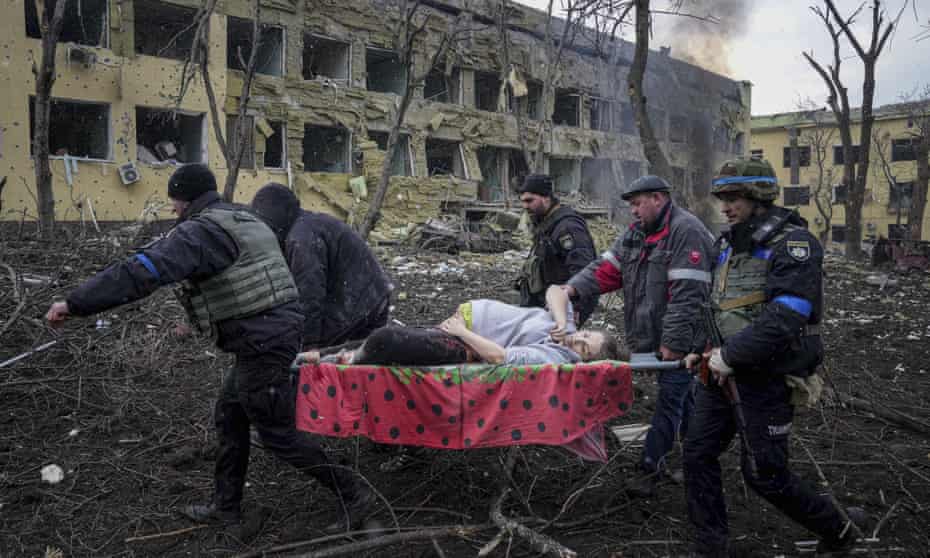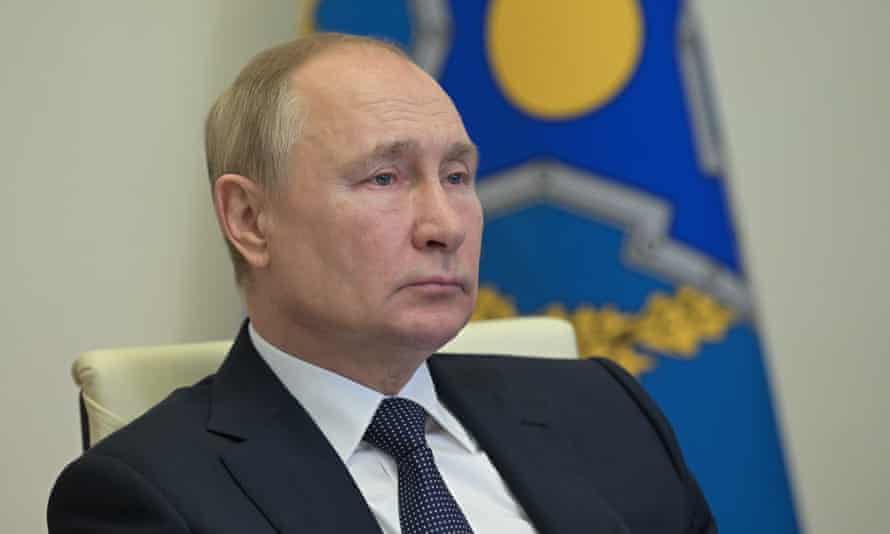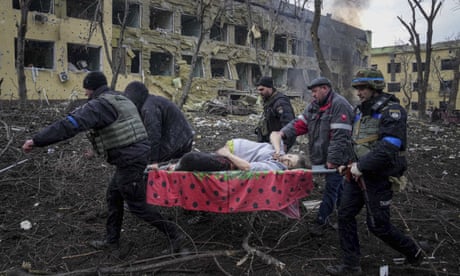Toxic Putin is going for bust. The west must stop him before this contagion spreads
Analysis: if we do not refuse to be blackmailed and step in to stop Russia, Ukraine will only be the start

Politically speaking, Vladimir Putin is a dead man walking. As dictators always do, he has fatally over-reached. Bunker-bound and bonkers, there’s no way back into the world for him. At home, too, he looks increasingly isolated.
But, militarily speaking, he’s not giving up. In Ukraine, the toxic president is going for bust. The worrying question: what will he do next?
Insofar as Putin still has a plan, it is to bomb and batter the Ukrainian people into submission, by whatever means necessary, as quickly as possible. If that requires using chemical weapons, such as chlorine gas, as in Syria, who can doubt he will do so. Last week’s Mariupol maternity hospital war crime was a harbinger of worse, perhaps far worse, to come.
Diplomats and analysts believe that, despite Ukraine’s unexpectedly effective resistance, Russia’s grip on the country is inexorably tightening. Vitali Klitschko, mayor of Kyiv, says the capital only has sufficient supplies for one or two weeks if attacked. Half the population has fled. If the allied powers sincerely want Ukraine to survive, time is running out.
The west must now maximise pressure on Putin – military as well as economic – as a matter of utmost urgency. Ukraine’s citizens and soldiers cannot be expected to hold out for very much longer without increased, all-round support. Ukraine’s future as an independent democratic state may be decided in the coming fortnight. So, too, may be the future of Putinism in Russia itself.

The oppressive, corrupt regime in Moscow that has blighted Russian lives for over 20 years, and spread fear and discord around the world, has never been weaker. This is a huge moment. Europe’s future security architecture could indeed be remodelled, as Russia has often urged, but on a post-Putin basis of cooperative, lawful, democratic co-existence, not a balance of terror.
This tantalising prospect is offset by the risk of all-out conflict with a nuclear-armed tyrant who, hemmed in by his own miscalculations, may lash out wildly. Nato’s ill-judged refusal to provide any form of no-fly zone, as requested by Ukraine’s president, Volodymyr Zelenskiy, or for example to create a UN-mandated safe zone on the ground in western Ukraine, stems from such fears.
So what will Putin do? Three main scenarios are in view: a compromise peace deal; a stalemate; or a wider, escalating war. After two weeks of fighting, there is much talk of talks but no actual peace process. Dashing hopes it might intervene, China has kept its distance. Last week’s foreign ministers’ meeting in Turkey was a deliberate stalling exercise by Moscow. The two sides remain miles apart.
Ukraine’s leaders will not agree to anything permanent while cities are besieged, vast swaths of their country are occupied, and heinous war crimes proliferate – and why should they? Nor is it likely that Putin will abandon his insistence that Ukraine remain separate from Nato and the EU, or give up his claims to Crimea and recently captured territory along the southern seaboard.
Under a second scenario, the war drags on, degenerating into a Donbas-like stalemate or frozen conflict. This would suit no one. It would be disastrous for Ukraine’s citizens, both the displaced and those who remain; for Ukraine’s integrity as a nation state; for bogged-down, demoralised Russian forces facing determined insurgents; and for international relations and stability, endlessly polarised and poisoned by Ukraine-related tensions.
Knowing this, and spurning peace, Putin is actively pursuing the third scenario: “doubling down” on military force, as CIA director William Burns put it last week, encircling cities, using hungry, freezing civilians as hostages, seizing more territory, and threatening a wider war, potentially involving chemical or even battlefield nuclear weapons.
Here is the crux of the west’s dilemma. The US and UK are pumping increasingly advanced weaponry into Ukraine on a vast scale. British anti-tank missiles, for example, are reportedly proving grimly lethal. Now Starstreak anti-aircraft weapons are also being deployed, ostensibly for “defensive”, not “offensive”, purposes.
Such sophistry aside, there can be no doubting where this massive Berlin airlift-type build-up is leading. Nato’s rejection of a no-fly zone and the US veto on supplying Polish MiG fighters to Ukraine’s air force cannot disguise the reality that the allies, de facto, are already party to this conflict or, in legal parlance, are “co-combatants”.
Putin characterises sanctions as western economic warfare. How much longer before he declares that Russia is also under western military attack, and escalates accordingly? That’s the firm expectation in the Baltic republics – Estonia, Latvia and Lithuania – frontline former Soviet republics that Putin regards, like Ukraine, as not “real” countries. The Russian enclave of Kaliningrad is another looming flashpoint.
Valdis Dombrovskis, a former Latvian prime minister, warned last week the Baltic states may be next in the firing line. “If we do not support Ukraine, it’s not going to stop in Ukraine… Unfortunately, it is likely this aggression will continue in other countries,” he said.
Discussing Putin’s veiled nuclear threat, Dombrovskis, an EU commission vice-president, said the west must not be intimidated.
“The question is, to what extent we are giving in to this blackmail because it can be used all the time against everything. Putin will continue his aggressive wars, he will always use this blackmail.”
Plainly, there is no risk-free path through this horror. But any outcome that destroys a European democracy, or rewards Russian aggression, is unsustainable in the long term. That will only guarantee more grief down the road. Logically, practically, morally, the west really has no choice.
Its leaders must now employ all possible levers – including the threat of direct military action – to stop Russia in its tracks in Ukraine, stop the mass murder of civilians, and stop the spread of the deadly Putin contagion.


No comments:
Post a Comment